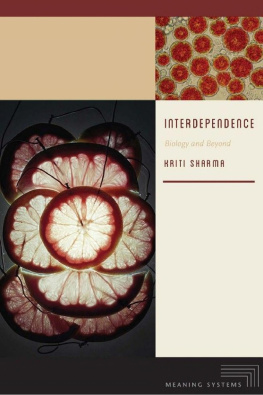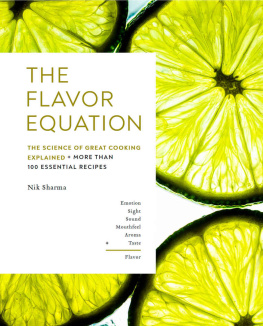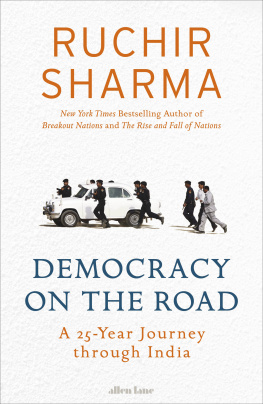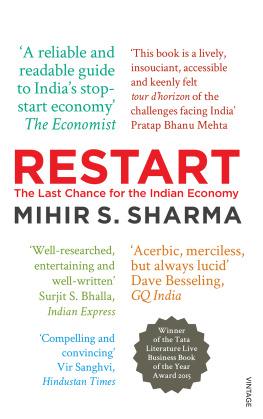Kriti Sharma - Interdependence: Biology and Beyond
Here you can read online Kriti Sharma - Interdependence: Biology and Beyond full text of the book (entire story) in english for free. Download pdf and epub, get meaning, cover and reviews about this ebook. year: 2015, publisher: Fordham Univ Press, genre: Romance novel. Description of the work, (preface) as well as reviews are available. Best literature library LitArk.com created for fans of good reading and offers a wide selection of genres:
Romance novel
Science fiction
Adventure
Detective
Science
History
Home and family
Prose
Art
Politics
Computer
Non-fiction
Religion
Business
Children
Humor
Choose a favorite category and find really read worthwhile books. Enjoy immersion in the world of imagination, feel the emotions of the characters or learn something new for yourself, make an fascinating discovery.
- Book:Interdependence: Biology and Beyond
- Author:
- Publisher:Fordham Univ Press
- Genre:
- Year:2015
- Rating:5 / 5
- Favourites:Add to favourites
- Your mark:
- 100
- 1
- 2
- 3
- 4
- 5
Interdependence: Biology and Beyond: summary, description and annotation
We offer to read an annotation, description, summary or preface (depends on what the author of the book "Interdependence: Biology and Beyond" wrote himself). If you haven't found the necessary information about the book — write in the comments, we will try to find it.
Interdependence: Biology and Beyond — read online for free the complete book (whole text) full work
Below is the text of the book, divided by pages. System saving the place of the last page read, allows you to conveniently read the book "Interdependence: Biology and Beyond" online for free, without having to search again every time where you left off. Put a bookmark, and you can go to the page where you finished reading at any time.
Font size:
Interval:
Bookmark:



SERIES EDITORS
Bruce Clarke and Henry Sussman
E DITORIAL B OARD
Victoria N. Alexander, Dactyl Foundation for the Arts and Humanities
Erich Hrl, Ruhr University Bochum
John H. Johnston, Emory University
Hans-Georg Moeller, Philosophy and Religious Studies Program, University of Macau, China
John Protevi, Louisiana State University
Samuel Weber, Northwestern University

Copyright 2015 Fordham University Press
All rights reserved. No part of this publication may be reproduced, stored in a retrieval system, or transmitted in any form or by any meanselectronic, mechanical, photocopy, recording, or any otherexcept for brief quotations in printed reviews, without the prior permission of the publisher.
Fordham University Press has no responsibility for the persistence or accuracy of URLs for external or third-party Internet websites referred to in this publication and does not guarantee that any content on such websites is, or will remain, accurate or appropriate.
Fordham University Press also publishes its books in a variety of electronic formats. Some content that appears in print may not be available in electronic books.
Visit us online at www.fordhampress.com .
Library of Congress Cataloging-in-Publication Data
Sharma, Kriti.
Interdependence : biology and beyond / Kriti Sharma.
pages cm. (Meaning systems)
Summary: From biology to economics to information theory, the theme of interdependence is in the air, framing our experiences of all sorts of everyday phenomena. Indeed, the network may be the ascendant metaphor of our time. Yet precisely because the language of interdependence has become so commonplace as to be almost banal, we miss some of its most surprising and far-reaching implications Provided by publisher.
Includes bibliographical references and index.
ISBN 978-0-8232-6552-7 (hardback) ISBN 978-0-8232-6553-4 (paper)
1. Autonomy (Philosophy) 2. BiologyPhilosophy. I. Title.
B808.67.S53 2015
111dc23
2014045376
Printed in the United States of America
17 16 15 5 4 3 2 1
First edition
To Om and Jyoti Sharma,
generous and loving parents.
To Rulia Ram Sharma, Kanta Sharma,
Giridhari Lal Nagar, and Raksha Nagar,
cherished and respected grandparents.
And to all the ancestors
upon whom this life depends.
Contents
Introduction: Taking Interdependence SeriouslyIt Depends: Contingent Existence
What Do Objects Depend On? Physical Substance, Matter, and the External World
What Does Sensing Depend On? Transduction, Energy, and the Meeting of Worlds
What Do Organisms Depend On? Bodies, Selves, and Internal Worlds
What Does Order Depend On? Patterns, Gaps, and the Known World
Conclusion: Life as We Know It Notes References Index Acknowledgments: What Does This Book Depend On?
Introduction
Taking Interdependence Seriously
You may have heard the phrase Its all connected before. What does it even mean ? Does it mean that an ice floe calving off the coast of Antarctica is about to cause the electricity to go out in your neighborhood? Does it mean that an intangible something knits together and resonates through all living and nonliving things, and we can tune into its hum? Does it point to the global economy and the vast network of actors and factors upon which each of our lives and personal fortunes depend? Does it refer to deer eating grass and wolves eating deer, or to electrons influencing each other across a distance? Is it a scientific fact? A spiritual experience? A political reality? A marketing slogan? An ethical claim?
Of course, the phrase Its all connected has meant all of these things and more, depending on the context in which it is used. What is being emphasized here is that the theme of interdependence is in the air, framing our experiences of myriad everyday phenomena. The network may be the ascendant metaphor of our time. Yet, it is precisely because the language of interdependence has become so commonplace as to be almost banal that we may miss some of its most surprising and far-reaching implications.
Nowhere, perhaps, is interdependence evoked as vividly and often as in the biological sciences. The careful work of biologists over millennia has produced a massive body of observations that illustrate a vibrant, intricate, causally complex world, in which products depend on processes, processes depend on products, wholes depend on parts, parts depend on wholes, and living beings depend on one another for our lives. The widespread interest in and acknowledgment of the interrelatedness of natural phenomena in biology thus creates the illusion of a coherent view of interdependence.
Still, I contend, the ascendant view of interdependence at play in biologyas in popular culture is not a view of interdependence at all . It remains a view of independence . By and large, we think that interdependence just means independent objects interacting . We say that things interact strongly, weakly, reciprocally, sequentially, and so on, but their ultimate independence from one another remains intact. Indeed, the network, which has enjoyed a place of privilege in biological thinking in the late twentieth and early twenty-first centuries, is just such a map of separate and interacting entities. As long as the ascendant view of interdependence continues to collapse implicitly to a view of independence, I believe that we continue to miss an important implication of our own findings. Our beautifully detailed observations of biological phenomena have been and continue to be interpreted as evidence that our world is composed of a great many independent entities coexisting in interaction. Instead, what these data may be suggesting is that our world is not composed of independent entities at all.
This is a book about how we might meet interdependence as interdependence instead of continuing to view our world implicitly as fundamentally or ultimately composed of independent entities. To take interdependence seriously in this way does not mean viewing phenomena as murky undifferentiated masses or as overwhelming tangles of connections. Though interdependence is often associated with complexity (in the sense of made up of many things) and has therefore often been assumed to be an intrinsically complex topic (in the sense of difficult and complicated), what I hope to show here is that a consistent theory of interdependence can actually be refreshingly simple, useful, and clarifying.
If there is a transition being madein biology as in physics, neuroscience, sociology, and morefrom viewing phenomena as independent to viewing them as interdependent, we can conceive of this transition as happening in two shifts. The first is a shift from considering things in isolation to considering things in interaction. This is an important and nontrivial move; it is also a relatively popular and intuitive concept in those fields. To get to a thoroughgoing view of interdependence, I argue that a second shift is required: one from considering things in interaction to considering things as mutually constituted , that is, viewing things as existing at all only due to their dependence on other things. This second shift is potentially more subtle and difficult than the first, because though the first requires considering the mutual relations and influences between things, it does not actually require a change in the many habits and assumptions that usually commit us to viewing things as fundamentally independent. The second shift requires recognizing and addressing these very habits, which currently obscure a thoroughgoing view of interdependence.
Next pageFont size:
Interval:
Bookmark:
Similar books «Interdependence: Biology and Beyond»
Look at similar books to Interdependence: Biology and Beyond. We have selected literature similar in name and meaning in the hope of providing readers with more options to find new, interesting, not yet read works.
Discussion, reviews of the book Interdependence: Biology and Beyond and just readers' own opinions. Leave your comments, write what you think about the work, its meaning or the main characters. Specify what exactly you liked and what you didn't like, and why you think so.













